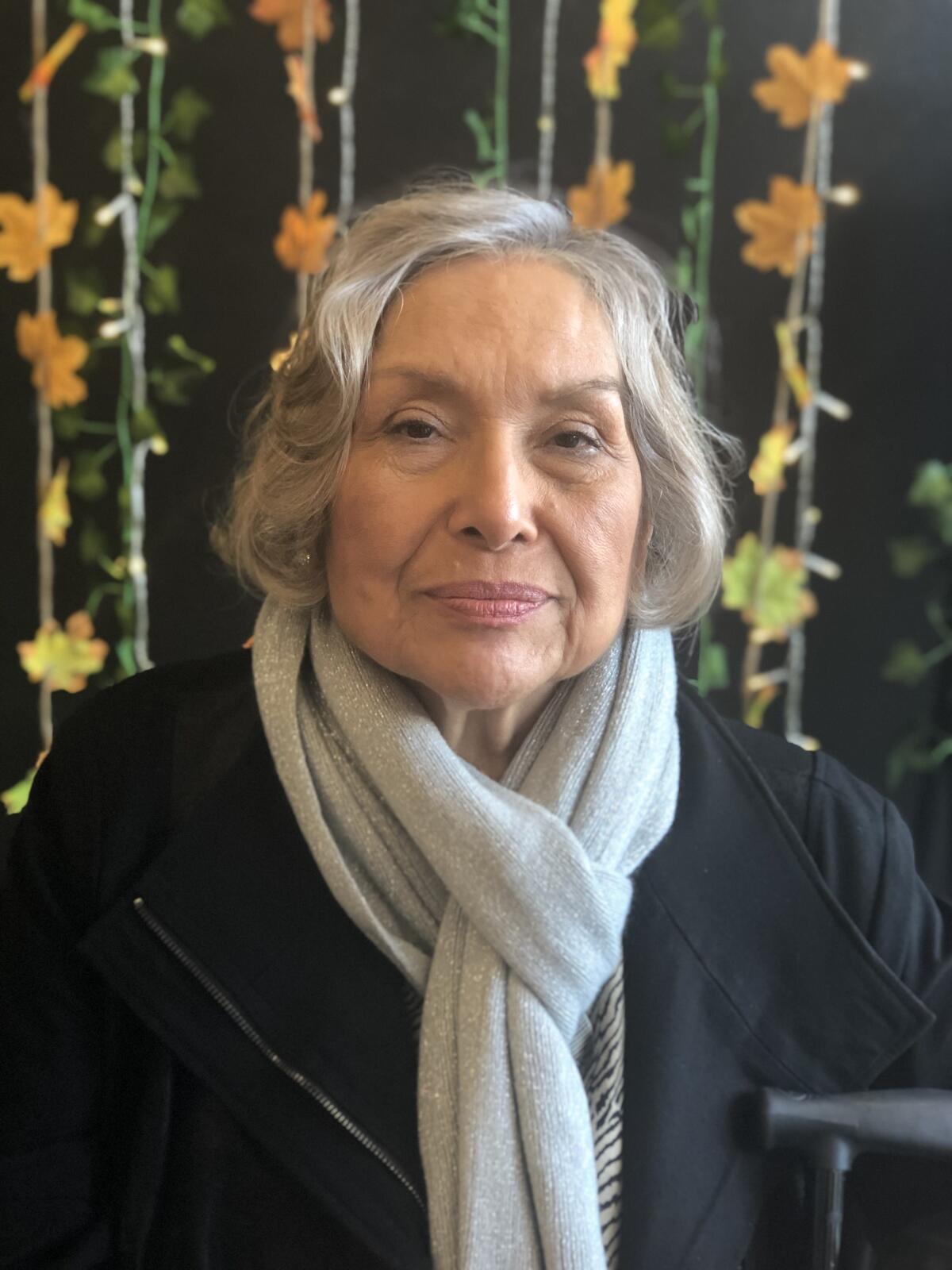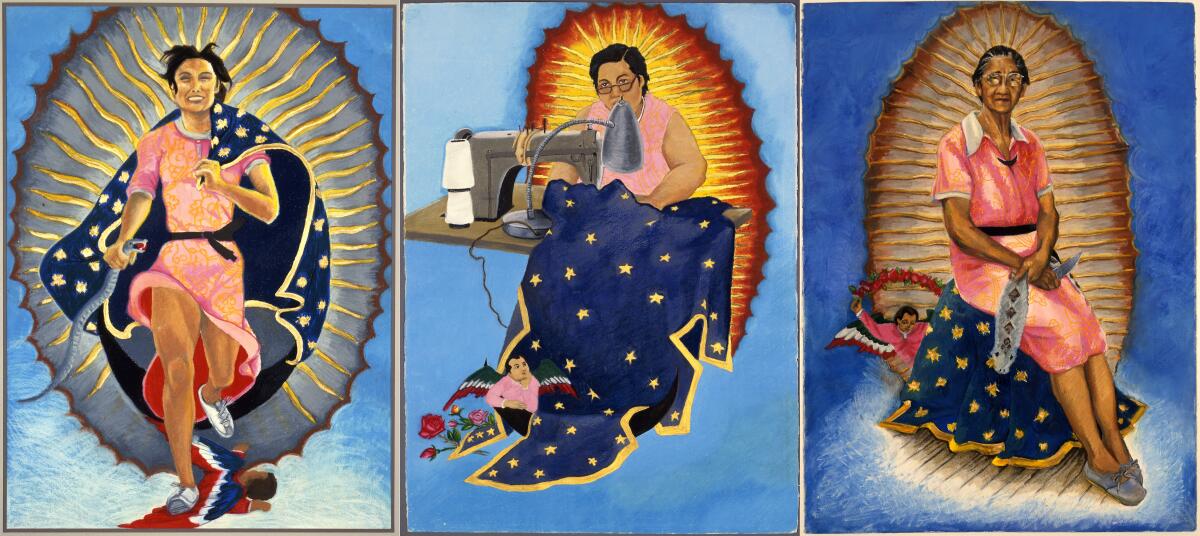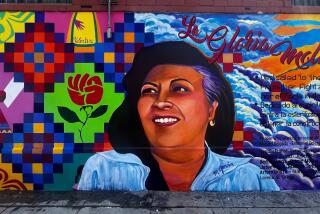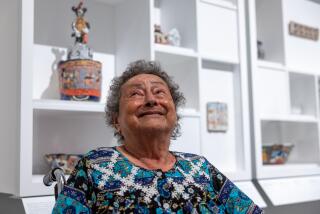Yolanda López, Chicana artist known for la Virgen de Guadalupe series, dies at 79

- Share via
In the late 1970s, Yolanda López began brainstorming ideas for her final project for a master’s degree in fine arts from UC San Diego. She settled on a venerated icon: the Virgin of Guadalupe.
Fusing her interest in conceptual and feminist art, López embarked on a series of paintings that reimagined the image of Mexico’s patron saint with herself, her mother and grandmother as stand-ins for the Empress of the Americas.
López stripped her docile demeanor and transformed herself and her family members into living, breathing, everyday yet holy brown women.
For her self-portrait, López painted herself exuberantly running in white sneakers while clutching a rattlesnake in one hand and holding the saint’s star-patterned mantle in the other. In the second piece, her sunburst-enveloped mother sews the blue cloth back together. The final image shows her grandmother sitting on La Virgen de Guadalupe’s mantle, holding a knife and a skinned rattlesnake.
Her series was so radical that the panel of university judges didn’t understand it and López, the only Latina in her class, had to explain the significance.
“I knew it was very dicey,” López said in a 2020 interview. “Most of my professors were not Christian. They were totally blind to the fact. I realized I had to tell them this is Christian image, this is the Virgin Mary, this is the mother of Jesus Christ. This is the Mexican version of the Virgin Mary.”

Although she wasn’t the first to reinterpret Guadalupe, López’s triptych became immediately iconic in its own right.
Her Guadalupe series is one of the earliest feminist reinterpretations of the Virgin of Guadalupe, which became a major focus of Mexican American artists who were influenced by López’s work, said Jill Dawsey, curator of the Museum of Contemporary Art San Diego. “Yolanda turns this image into a figure seen as rebellious and with unbridled joy and that’s key to her legacy and what she put into the world.”
It set a high standard that López topped again and again in multiple platforms, in a career that continued through the cancer that ultimately took her life. She died Friday morning in her longtime apartment in San Francisco’s Mission District, according to her son, artist Rio Yañez. López was 79.
“She had the razor-sharp wit of a satirist and traded barbs and sits [with] the best of them,” Culture Clash co-founder Richard Montoya wrote on Facebook. He was one of a group of artists and friends who said their goodbyes to López in her final weeks. “She wanted artists to embrace our intellectuality and its fevered origins.”
López was born in 1942 and raised in San Diego’s Barrio Logan neighborhood. Days after she graduated from high school, López packed her belongings in a suitcase and moved to the Bay Area with her uncle and his male partner, looking to leave her conservative hometown and join the counterculture.
The young Chicana jumped into the Bay Area’s activist scene. She joined the Student Nonviolent Coordinating Committee and the Third World Liberation Front, and was part of the five-month strike at San Francisco State College that shut down the school and prompted the creation of the nation’s first College of Ethnic Studies and Department of Black Studies. But it was her involvement with a police brutality case that earned López her first plaudits for art.
In 1969, she drew a poster titled “Free Los Siete” that featured the faces of seven wrongfully imprisoned Latino men behind the stripes of a U.S. flag made to look like prison bars. It was a constant at rallies for their ultimate freedom.

Then there was her 1978 poster titled “Who’s the Illegal Alien, Pilgrim?” The black-and-white image depicts a man in an Aztec headdress and armband with a stern face, aggressively pointing a finger like Uncle Sam as he crumbles a bundle of notes titled “Immigration Papers.”
“I wanted to portray a feminist gift to movement men,” López said in a 2020 interview. “An expression, anger, self-righteousness.”
López lectured, produced videos and created installations throughout her career. But her muse remained the Virgin of Guadalupe. She reimagined Guadalupe as an Indigenous women nursing her child, as the Aztec goddess Coatlicue and as Boticelli’s Venus. Mexican critics fumed when her “Walking Lupe” — Guadalupe in open-toe heels, calves exposed under a shorter version of her traditional dress — graced the cover of the Mexican feminist magazine Fem in the mid-1990s. The magazine’s headquarters in Mexico City received bomb threats.
Her son, Rio Yañez, recalled how galleries that showed her work were frequently vandalized. Strangers would leave death threats over the phone or confront López at exhibits.
“I think of Sarah Connor on ‘Terminator 2’ of how I pictured my mom,” Yañez said. He was the inspiration behind her 1988 piece “Things I Never Told My Son About Being a Mexican,” which used the cheery setting of an elementary-school bulletin-board project to discuss assimilation, stereotypes and racism.
López’s work became a mainstay of exhibitions and permanent collections — prints of “Free Los Siete” and “Who’s the Illegal Alien, Pilgrim?” are with the Smithsonian American Art Museum. As recently as this year, she released reprints of her artwork on business cards with sayings such as, “Once we as women start treating [men] as victims of patriarchy, they will begin to rebel against it, but they will begin to understand it.”
But no one ever approached López to do a solo museum show until 2019, when Dawsey expressed her interest to host one at the Museum of Contemporary Art San Diego.
In their first meeting, López almost immediately asked her guest one question: What year did the Vietnam War end? Dawsey answered correctly.
In following meetings, the two had dinner to discuss Dawsey’s offer, and López invited Dawsey to her damp basement, where she kept the bulk of her work, some that she hadn’t unearthed since the 1970s. Her art from the 1970s and ’80s will be featured as “Yolanda López: Portrait of the Artist.” It is scheduled to open Oct. 16.
More to Read
Start your day right
Sign up for Essential California for the L.A. Times biggest news, features and recommendations in your inbox six days a week.
You may occasionally receive promotional content from the Los Angeles Times.








